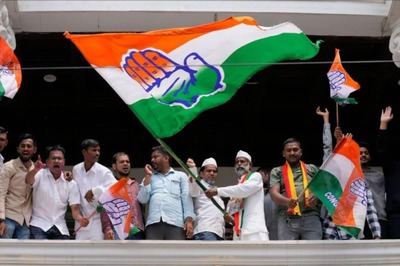
views
Hong Kong: Pro-democracy demonstrators planned on Sunday to choke travel routes to Hong Kong's international airport after a chaotic night of running battles between police and masked protesters, the latest wave of unrest to hit the Chinese-ruled city.
Protest organisers have urged the public to overwhelm road and rail links to the airport, one of the world's busiest, on Sunday and Monday, potentially disrupting flights. People would begin gathering at 1pm (0500 GMT), protest groups said. The airport closed one of its car parks and advised passengers to use public transport, without giving a reason.
A similar so-called "stress test" of the airport last weekend failed to gain momentum. Three weeks ago, some flights were delayed or cancelled after protesters swarmed the airport.
Late on Saturday and into the early hours, police fired tear gas, water cannon and rubber bullets and protesters threw petrol bombs, escalating clashes that have plunged the Asian financial centre into its worst political crisis in decades.
As government helicopters hovered overhead, protesters who had been banned from demonstrating set fires in the streets and threw bricks at police near government offices and Chinese military headquarters.
Officers fired two warning shots in the air to scare off a group of protesters who had them surrounded and were trying to steal their pistols, the police said, only the second time live rounds have been used in more than three months of unrest.
Police sprayed demonstrators with blue-dyed water to make it easier to identify them later.
Parts of the metro system ground to a halt as skirmishes spread to the subway, with television showing images of people being beaten as they cowered on the floor behind umbrellas.
Police said they arrested 40 people inside Prince Edward metro station on suspicion of obstructing officers, unlawful assembly and criminal damage. Three stations stayed shut on Sunday.
"A large group of protesters participated in unlawful assembly in various districts since yesterday, despite police’s objection and warning," police said in a statement. "The level of violence is rapidly escalating and their illegal acts have no regard to the laws of Hong Kong."
The protests came on the fifth anniversary of China's decision to curtail democratic reforms and rule out universal suffrage in Hong Kong, a former British colony that was returned in 1997.
The unrest began in mid-June, fuelled by anger over a now-suspended extradition bill that would have allowed people in the city to be sent to mainland China for trial in courts controlled by the Communist Party.
But the turmoil has evolved over 13 straight weeks into a widespread demand for greater democracy in a territory that many residents believe is increasingly being controlled by Beijing. China denies meddling in Hong Kong's affairs.
Hong Kong returned to China under a "one country, two systems" formula that allows it freedoms not enjoyed on the mainland, such as the right to protest and an independent legal system.
The unrest poses the gravest challenge to Chinese President Xi Jinping since he took power in 2012, with his government keen to end the protests before the 70th anniversary of the founding of the People’s Republic of China on October 1.
















Comments
0 comment